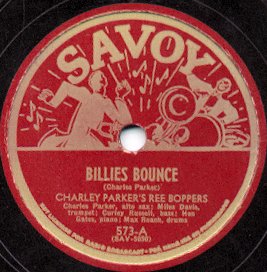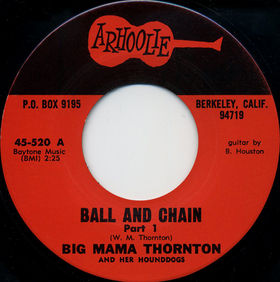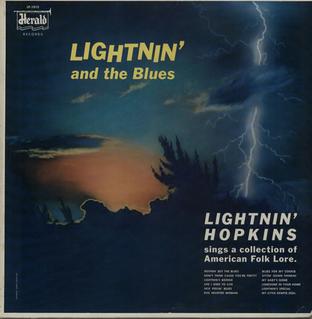Related Research Articles

Samuel John "Lightnin" Hopkins was an American country blues singer, songwriter, guitarist and occasional pianist from Centerville, Texas. In 2010, Rolling Stone magazine ranked him No. 71 on its list of the 100 greatest guitarists of all time.

Gold Star Records is an American independent record label, which was founded in 1941.

Savoy Records is an American record company and label established by Herman Lubinsky in 1942 in Newark, New Jersey. Savoy specialized in jazz, rhythm and blues, and gospel music.
Texas blues is blues music from Texas. As a regional style, its original form was characterized by jazz and swing influences. Later examples are often closer to blues rock and Southern rock.
Fire Records was an American independent record label, set up in 1959 by Bobby Robinson. Amongst others, it released records by Lightnin' Hopkins, Elmore James, Buster Brown and Arthur Crudup. At one point it was thought Fire had issued the last commercial 78rpm disc in the United States. Although this has been dis-proven, the label is still known for their late-issue 78s.
The Mello-Kings were an American doo-wop group, who became popular in the late 1950s with their song, "Tonite, Tonite" (1957).
Tradition Records was an American record label from 1955 to 1966 that specialized in folk music. The label was founded and financed by Guggenheim heiress Diane Hamilton in 1956. Its president and director was Patrick "Paddy" Clancy, who was soon to join his brothers Liam and Tom Clancy and Tommy Makem, as part of the new Irish folk group, The Clancy Brothers and Tommy Makem. Liam Clancy designed the company's maple leaf logo. Columbia University Professor of Folklore Kenneth Goldstein was also involved in the early creation of the company, which operated out of Greenwich Village, New York, United States.

"Silhouettes" is a song made famous by the doo-wop group the Rays in 1957. A competing version by the Diamonds was also successful. In 1965 it was a number 5 hit in the US for Herman's Hermits, and in 1990 it was a number 10 hit in the UK for Cliff Richard.

"Ball and Chain" is a blues song written and recorded by American blues artist Big Mama Thornton. Although her recording did not appear on the record charts, the song has become one of Thornton's best-known, largely due to performances and recordings by Janis Joplin.
Buster Pickens was an American blues pianist. Pickens is best known for his work accompanying Alger "Texas" Alexander and Lightnin' Hopkins. He also recorded a solo album in 1960.
Frankie Lee Sims was an American singer-songwriter and electric blues guitarist. He released nine singles during his career, one of which, "Lucy Mae Blues" (1953), was a regional hit. Two compilation albums of his work were released posthumously.

Texas Johnny Brown, born John Riley Brown was an American blues guitarist, songwriter and singer, best known for his composition "Two Steps from the Blues". In a lengthy career, he worked with Joe Hinton, Amos Milburn, Ruth Brown, Bobby Bland, Lavelle White, Buddy Ace and Junior Parker. He was born in Mississippi, but his long association with Houston, Texas, gave him his stage name.
Ember Records was an American independent record label, run by Al Silver in New York City as the sister label to his Herald imprint. Among the artists on the label were the Five Satins, who recorded the Fred Parris song "In the Still of the Night", and New Orleans saxophonist Lee Allen who hit with "Walking With Mr. Lee". Herald and Ember closed down in the mid-1960s.

Lightnin' is an album by the blues musician Lightnin' Hopkins, recorded in 1960 and released on the Bluesville label the following year.

Goin' Away is an album by the blues musician Lightnin' Hopkins, recorded in 1963 and released on the Bluesville label.

Lightnin' in New York is an album by the blues musician Lightnin' Hopkins, recorded in 1960 and released on the Candid label the following year.

Lightnin' Hopkins is an album by blues musician Lightnin' Hopkins, recorded in 1959 and released on the Folkways label. The album was first released around the time that the book The Country Blues came out and was an instant success. It gave Hopkin's career a new lease on life.

Mojo Hand is an album by the blues musician Lightnin' Hopkins, recorded in 1960 and released on the Fire label in 1962.

Lightnin' and the Blues is a 12-inch LP album by blues musician Lightnin' Hopkins, collecting twelve tracks recorded in 1954 that were originally released as 7-inch singles on the Herald Records label. From the late 1980s, other Herald tracks began appearing on collections like The Herald Recordings – 1954 and The Herald Recordings Vol. 2 before a 30-track CD edition was released in 2016.
"Too Many Drivers"is a blues song recorded by Big Bill Broonzy in 1939. It is performed in an acoustic ensemble-style of early Chicago blues and the lyrics use double entendre often found in hokum-style blues songs. The song has been identified as one of Broonzy's more popular tunes and has been recorded over the years by a variety of artists, who often who use alternate titles, such as "Little Car Blues", "Little Side Car", "Automobile Blues", and "Let Me Ride Your Little Automobile".
References
- ↑ O'Brien, Timothy J.; Ensminger, David (2013). Mojo Hand: The Life and Music of Lightnin' Hopkins . University of Texas Press. pp. 69–70. ISBN 9780292745155.
- ↑ Broven, John (2009). Record Makers and Breakers: Voices of the Independent Rock 'n' Roll Pioneers . University of Illinois Press. p. 373. ISBN 9780252032905.
- ↑ Arena, Neil (2022). Tonite, Tonite - the story of the original Mello-Kings. London: Arena & Stephens. p. 206. ISBN 9781739083199.